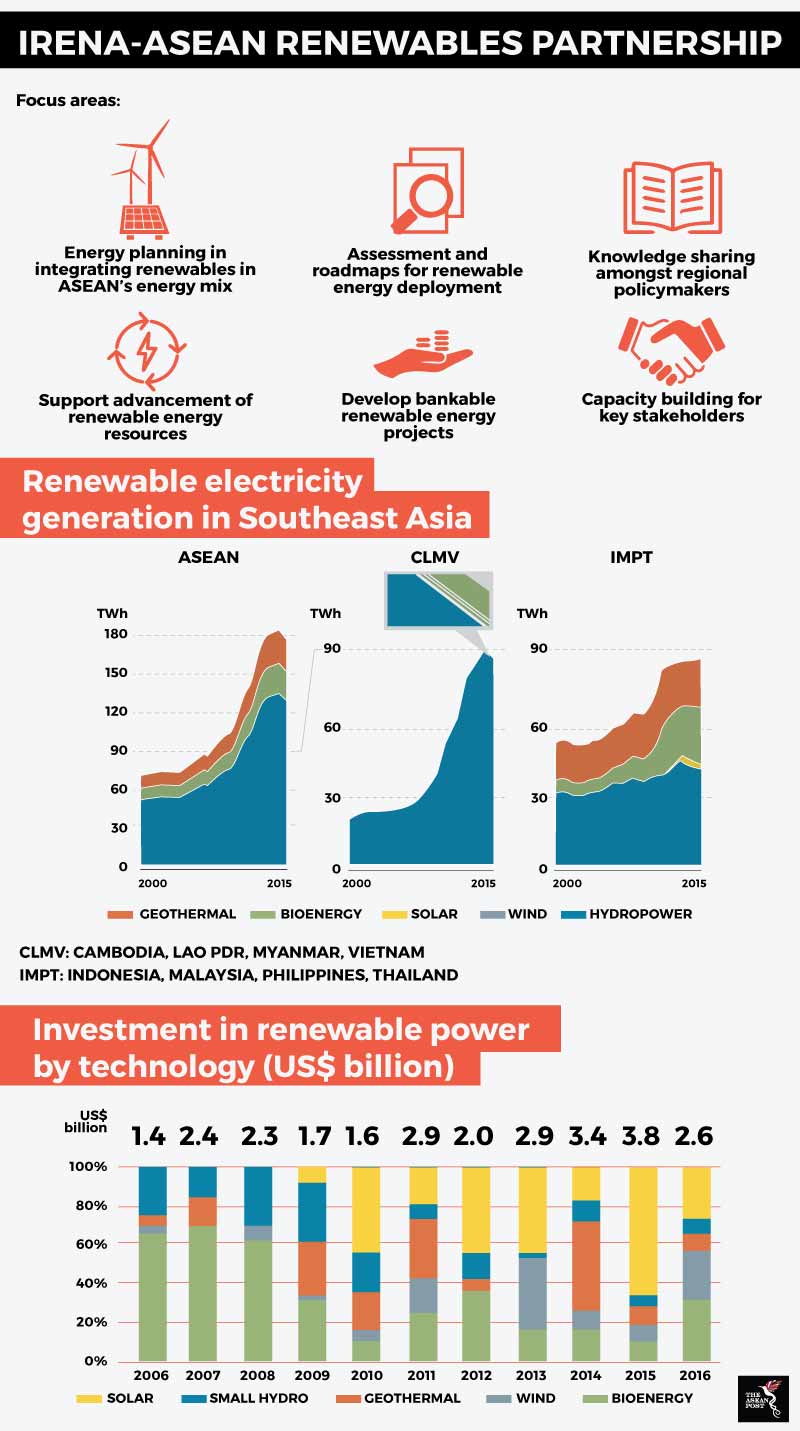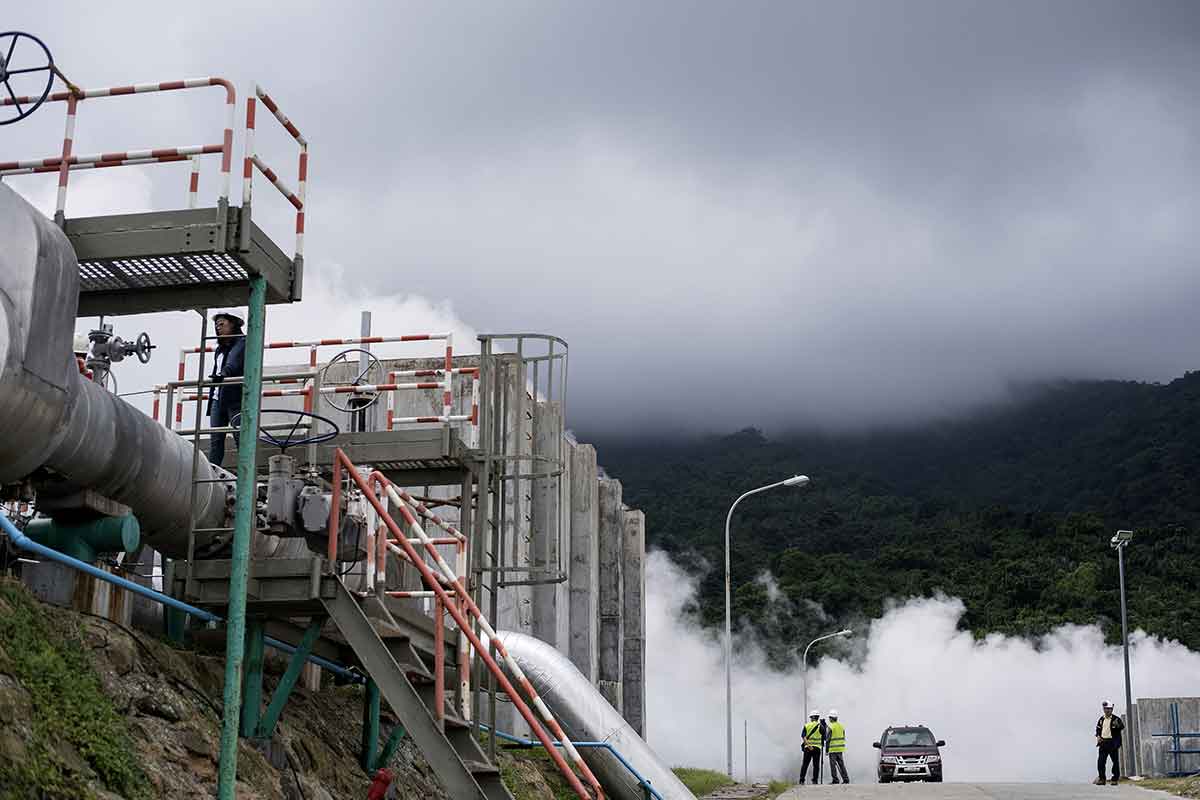The International Renewable Energy Agency (IRENA) and the Association of Southeast Asian Nations (ASEAN) have forged a new partnership which aims to scale up renewable energy deployment in the region and advance the transition towards an energy sustainable future.
A memorandum was signed on the side-lines of the 36th ASEAN Ministers on Energy (AMEM) and the Singapore International Energy Week (SIEW) on 30 October, 2018.
The agreement provides a framework in which ASEAN and IRENA can cooperate to strengthen the enabling environment for renewable energy investment and deployment. This comes at a crucial juncture in ASEAN’s long-term plan to achieve an aspirational target of 23 percent of primary energy from renewables by 2025.
It will see IRENA and ASEAN Energy Ministers work closely across a number of key focus areas, including energy planning, acceleration of renewable energy deployment, knowledge sharing, advancement of renewable energy resources, development of bankable renewable energy projects and multi-stakeholder capacity building.
“Southeast Asia is a dynamic and rapidly evolving region with strong economic growth, rising incomes and growing populations, factors that will increase regional demand for power,” said Adnan Amin, Director-General of IRENA.
“Renewables will be the key to addressing this growing demand and ensuring energy security, while powering the inclusive and sustainable economic development of the region,” he added.
Analysis by IRENA and the ASEAN Centre for Energy (ACE) indicate that US$290 billion of total investment in renewable energy capacity is required for ASEAN to reach its goal. As such, renewable energy investment would need to be substantially scaled up to an estimated US$27 billion annually. This is equivalent to one percent of the region’s gross domestic product (GDP) for the next eight years and represents a tenfold increase on 2016 investment volumes.
Amin continued that the partnership stands to unlock the vast renewable energy potential that exists in the region that can be harnessed to deliver widespread benefits to all 10-member states of ASEAN.
“IRENA will work closely with ASEAN to implement a joint action plan that ensures Southeast Asia continues its remarkable economic story in a new age of energy,” he affirmed.

Source: IRENA
Socio-economic benefits
Developments in renewable energy also offer plenty of socio-economic benefits on a regional scale, including the creation of new value chains, jobs and improved livelihoods. IRENA estimates that as of 2016, renewable energy accounted for 611,000 jobs in Southeast Asia.
A majority of these jobs were credited to liquid biofuel production, followed by large hydropower and solar photovoltaics (PV). Combined, these three renewable energy sources account for about 94 percent of all renewable energy employment in the region.
These three technologies are slated to grow even further going into the future. Projections by IRENA indicate that by 2030, employment opportunities created by renewable energy technologies will almost triple, from 611,000 to between 1.7 million to 2.2 million jobs.
Echoing Amin’s view, Lim Jock Hoi, Secretary-General of ASEAN acknowledged the importance of transitioning to renewables and the benefits of supporting a sustainable agenda for the betterment of all ASEAN member states.
He heralded the agreement with IRENA as an “extension of the close relationship” between the two which would facilitate greater knowledge transfer in terms of policy and best practices implementation.
“The world is evolving. New technologies and innovative approaches present important social and economic opportunities,” he said, adding that the partnership would “help ASEAN member states transition to low carbon growth and contribute to the attainment of sustainable development.”
IRENA is already playing a key role in ASEAN’s journey towards energy transformation. In its previous work with ACE, the jointly produced report showed that ASEAN’s renewables target is attainable and that the region can benefit from lower overall costs, cleaner cities and better energy security if it relies more on renewables.
ASEAN Energy Ministers have also expressed their confidence that the MoU with IRENA will help to rapidly close the region’s renewables deployment gap; making the region’s aspirational renewables goal significantly closer than ever before.
Related articles:
Overcoming challenges to sustainable energy development
Renewable energy development to create jobs in Southeast Asia
